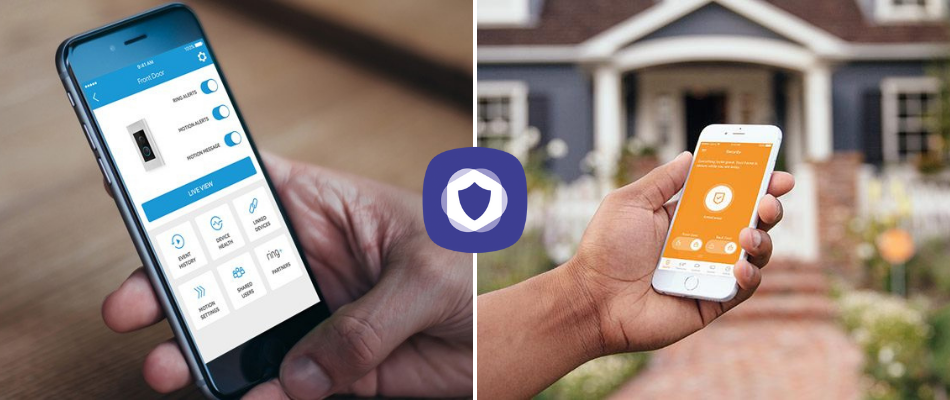When shopping for a home security system, it’s natural to want to know which is best. But if you’re looking at both Vivint and Ring, the answer isn’t so clear cut. That’s because Vivint and Ring are two very different companies, with different offerings at different price points. The right one for you is going to depend on exactly what you’re looking for in a home security system, as well as any smart home features you’d like to integrate. Cost also plays a big factor in this decision. Thankfully, our Security Nerd has done the research to help you make your pick.
Here, we’ll cover what Vivint and Ring security systems have in common, as well as how they differ. Plus, what you need to know when making the ultimate decision of Vivint vs. Ring.
| Vivint | Ring | |
|---|---|---|
| Hardware | 4 | 3 |
| Customer Service | 3 | 4 |
| Pricing | 3 | 5 |
| Mobile App | 4.5 | 3 |
| Smart Home Capabilities | 5 | 3 |
| Monthly Monitoring Cost | $39.99 and up | $10 |
| Upfront Cost | Starting at $100 | $199 and up |
| MoneyBack Guarantee | 14 days | 30 days |
| Contract Length | 60 months | None |
| Installation | Pro | DIY (pro available) |
| Basic Equipment | Call for quote | $199 and up |
Our pick: Vivint
We picked Vivint because it of its good quality equipment, highly rated mobile app and excellent smart home capability, but keep in mind that all those strengths also come with a higher price tag. Ring is more moderately priced and typically requires a DIY installation but you could save a bundle over time with its low ($10 per monthly) monitoring fee or its option to self-monitor.
Vivint and Ring What do they have in common?
The main similarity between Vivint and Ring is that they both are smart home companies that happen to have security systems as part of their offerings. When it comes to the security systems themselves, there are a few features that make them alike:
- Security system functionality: Both Vivint and Ring security systems work in a similar fashion. They both have the options to get window and door sensors, water/flood sensors, smoke detectors, and video cameras. When any unusual activity is sensed, the alarm is set off. You can even get alerts on their smart-device apps.
- Wireless: Both security systems communicate over cellular and/or Wifi, so there are no wires for intruders to cut and disable the system. Note that some equipment, such as a doorbell camera, may need to be wired into your electrical system or plugged into an outlet. (Vivint and Ring were both named one of our best wireless security systems.)
- Customizable systems: Vivint and Ring are both ultra-customizable, as far as which equipment you can have as part of your security system. With Vivint, you work with a representative to create a package and get a custom quote. With Ring, you can do the same for yourself on the Ring website.
- Professional monitoring available: Part of the deal with Vivint is that it’s monitored—its monitoring team is available 24/7 to call emergency services if you need it. Ring doesn’t have to be professionally monitored—you can just monitor it yourself through the app if you want—but it can be, for a monthly cost.
- Integration with smart home features: In addition to the security features, both Vivint and Ring also offer (or are compatible with) smart thermostats, doorbell cameras, smart lights and smart plugs. That way, you can control your security system and smart home items with the same app.
Vivint vs Ring: What are the differences?
- Control unit: Both security systems come with a control unit, but Vivint’s is much more advanced. It’s a sleek touchscreen monitor, while Ring’s is a more barebones push-button model.
- Professional vs. DIY installation: Vivint is meant to be professionally installed, while Ring is usually a DIY install. However, you can pay a pro to install Ring if you really don’t want to do it yourself.
- Payment structure: With Vivint, you’ll likely only pay for installation upfront and then pay off the equipment over time with monthly fees. Ring’s equipment is the main purchase, usually made upfront, but the company also offers the option to finance it. Then you can choose to pay for monthly monitoring or DIY monitor for free.
- Contract vs. no contract: If you go with Vivint, you’ll likely sign a contract of up to 60 months, but even if you get professional monitoring with Ring, you won’t have to sign a contract and can cancel at any time.
Vivint: What you need to know
If you’re leaning toward Vivint, you’re likely attracted to its full scope of service, including a wide array of products, professional installation and 24/7 monitoring. There are some pros and cons you should understand before you sign a contract.
Nerd Pros
- Professional assistance: Need help? Vivint customer service will create a custom package and price for you based on your unique needs and wants. Plus, professional installation takes out any guesswork on your part.
- Smart-home compatibilities: Vivint offers a ton of smart home features you can add on to your security system, including smart locks, a doorbell camera, smart thermostat, smart lights and garage door control. It also integrates with popular smart home products from Google Home, NestThermostat, Amazon Echo and Philips Hue.
- Easy mobile app: The Vivint app is easy to use and offers detailed notifications. It gets excellent reviews from users.
Nerd Cons
- Price: Vivint isn’t cheap. Costs are on par with big-name security companies like ADT. The bulk of the costs will be wrapped into monthly fees, instead of upfront.
- Limited availability: Vivint isn’t available in areas without strong cellular service.
- Long contract: Contracts can cover up to 60 months, and that’s how long it may take to pay off the equipment. That’s a big one to note when comparing to no-contractRing.
Read our full review of Vivint.
Ring: What you need to know
The Ring home alarm system is a solid user-friendly option for DIY home security. It comes with its own set of pros and cons potential customers should be aware of.
Nerd Pros
- Price: Ring comes at a hard-to-beat price point—a five-piece alarm kit is just $199. Plus, all add-ons are a la cart, so you can choose exactly what you want in your home—no more, no less. Professional monitoring is just $10 per month or $100 per year, or you can self-monitor for free.
- Easy installation: The DIY installation is easy, and the app can walk you through the whole thing. Not handy? The good news is, you can pay a pro to install it instead.
- No long-term contracts: If you choose professional monitoring, there is no contract to keep you tied in. Cancel at any time.
- Neighbors app. Ring offers an app where neighbors can share videos and security alerts with each other, which can help you stay on top of what’s going on in your area.
- Voice control. Ring can be used with Amazon Alexa for voice control.
Nerd Cons
- Very basic control pad: Ring’s screen-less keypad is pretty low-tech compared to Vivint’s touchscreen Smart Hub.
- Sensor glitches: Perhaps Ring customers’ most common complaint is that its door and window sensors can be glitchy.
- Security stickers and yard signs are separate: Most professional monitoring companies—Vivint included—include stickers and/or yard signs for free. But, with Ring, you’ll have to buy your own.
- Fewer in-brand smart-home compatibilities: Ring doesn’t offer its own smart locks, smoke/CO alarm or smart garage door controls. So you’ll have to purchase from compatible brands if you want to add certain functions to your smart home system.
Read our full review of Ring.
Ring Security vs Vivint: The bottom line
In the end, the decision might come down to which equipment you prefer, what type of installation you want and whether or not you’d rather pay upfront or over time. Take a hard look at what kind of budget you’re working with and think about whether or not you’re willing to customize and install a security system yourself. In the end, both Vivint and Ring are good companies, so you can’t really go wrong
Made your call?
This article has been reviewed and approved by Officer Banta.

Officer Banta is the official SecurityNerd home security and safety expert. A member of the Biloxi Police Department for over 24 years, Officer Banta reviews all articles before lending his stamp of approval. Click here for more information on Officer Banta and the rest of our team.

